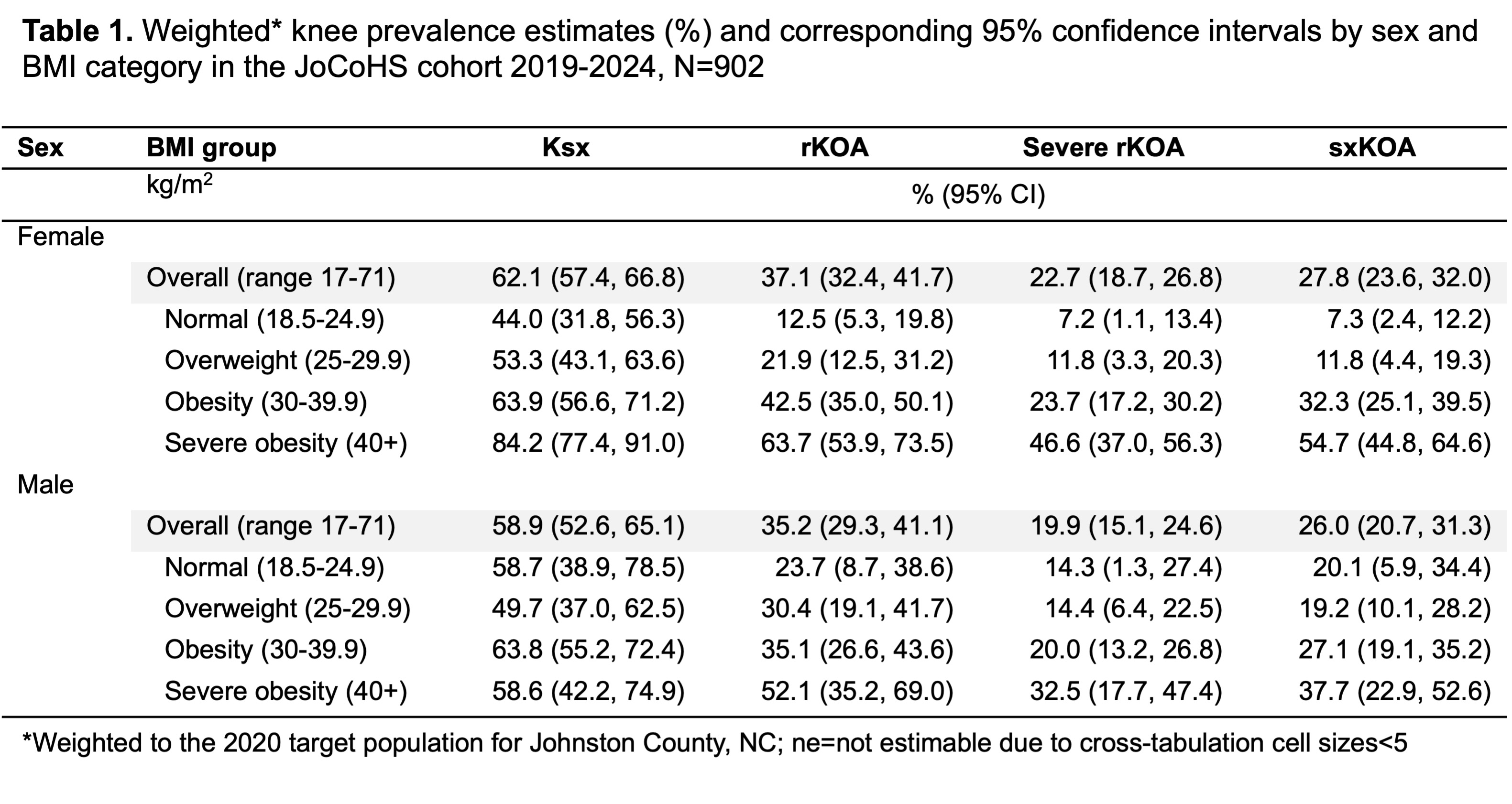Session Information
Session Type: Poster Session A
Session Time: 10:30AM-12:30PM
Background/Purpose: To report sex and BMI differences among ultrasound (US) features of knee osteoarthritis (KOA), patient-reported symptoms (Ksx), radiographic KOA (rKOA), and symptomatic KOA (sxKOA), in a general population.
Methods: Johnston County Health Study participants (JoCoHS, 2019-24, n=902) provided data on demographics, comorbidities, clinical features and symptoms, along with imaging using standardized acquisition and scoring. Prevalence (weighted to the 2020 census population for Johnston County, North Carolina) estimates and 95% confidence intervals (CI) for Ksx, rKOA, sxKOA, severe rKOA, and US features were calculated overall and for sex and BMI subgroups, at the person-level under a stratified sampling design. No formal testing is performed for differences among subgroups, instead CI indicate precision of estimates and the overlap among subgroups. RKOA was defined as Kellgren-Lawrence grade ≥ 2, severe rKOA as grades 3-4, and sxKOA as both rKOA and Ksx in the same knee. Standardized US features were obtained as previously reported (PMID39989271).
Results: The population was majority female (67%), non-Hispanic white (66%) with an average age of 55 ± 10 years and average BMI of 33 ± 8 kg/m2. Of these, 861 individuals had US imaging (no major demographic differences existed compared to the overall group). The overall weighted prevalence of Ksx, rKOA, sxKOA, and severe rKOA, were 61%, 36%, 27%, and 21%, respectively, and all were higher among females and participants with overweight/obesity (Table 1). Among both sexes, rKOA, sxKOA, and severe rKOA were more prevalent among those with severe obesity compared to those with obesity (Table 1). Among those with severe obesity, the prevalence of Ksx was greater among females than males with non-overlapping confidence intervals (Table 1). Mild (grade 1) US features were seen in one-third to one-half of knees. Grey-scale (GS) effusion and synovitis were more prevalent among males compared with females, particularly when moderate or severe (Table 2). In contrast, US findings of medial and lateral cartilage damage were more prevalent in females than males (Table 2). With increasing levels of obesity, effusion/synovitis were less prevalent while osteophytes and medial cartilage damage were more prevalent (Table 3). Additionally, among knees with rKOA compared to those without, osteophytes, meniscal extrusion, calcium crystals, and moderate to severe cartilage damage were much more prevalent (data not shown).
Conclusion: We identified differences in the prevalence of US features of KOA, Ksx, rKOA, sxKOA, and severe rKOA particularly among females with severe obesity. Prior prevalence studies have not distinguished between obesity and severe obesity, due to the relatively small proportion of the population within the severe obesity category. The data above reveals non-overlapping 95% confidence intervals in outcome prevalence among levels of obesity, which should be investigated further. This differentiation could lead to the development of more effective prevention and treatment strategies, as well as a better understanding of the distinct mechanisms driving knee OA in individuals with severe obesity.
To cite this abstract in AMA style:
Patel M, Alvarez C, Schwartz T, Walker T, Savage-Guin S, Renner J, Samuels J, Lin J, Kohler M, Bakewell C, Golightly Y, Nelson A. Prevalence of Radiographic and Symptomatic Osteoarthritis, and Ultrasound Features at the Knee: The Johnston County Health Study [abstract]. Arthritis Rheumatol. 2025; 77 (suppl 9). https://acrabstracts.org/abstract/prevalence-of-radiographic-and-symptomatic-osteoarthritis-and-ultrasound-features-at-the-knee-the-johnston-county-health-study/. Accessed .« Back to ACR Convergence 2025
ACR Meeting Abstracts - https://acrabstracts.org/abstract/prevalence-of-radiographic-and-symptomatic-osteoarthritis-and-ultrasound-features-at-the-knee-the-johnston-county-health-study/


.jpg)
.jpg)